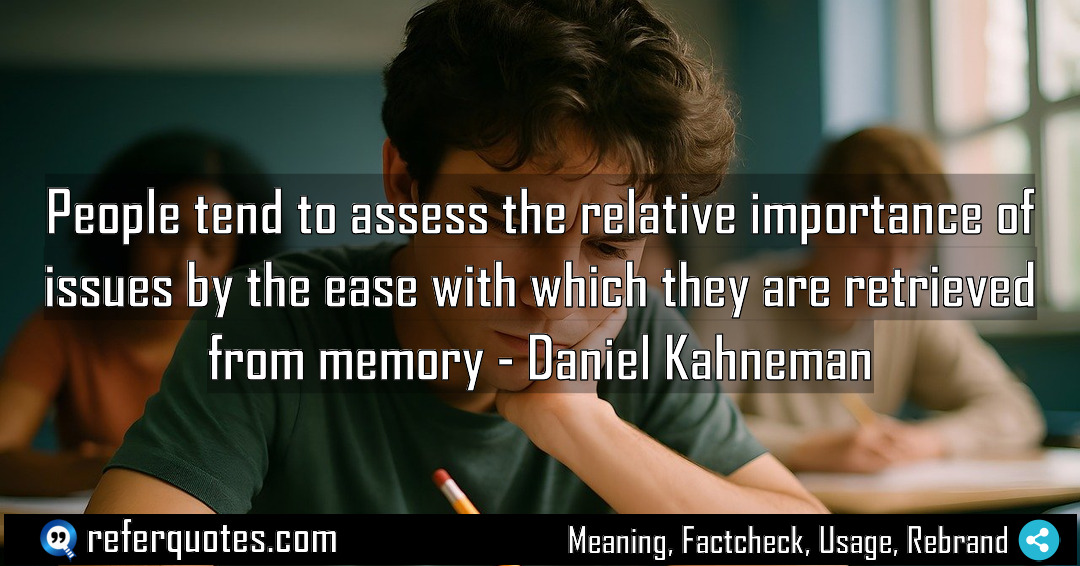You know how “People tend to assess the relative importance” of stuff based on what pops into their head first? That’s Kahneman’s big idea. It’s not about what’s actually important, it’s about what’s mentally available. Your brain takes a shortcut, and it dramatically shapes your reality.
Share Image Quote:Table of Contents
Meaning
Our judgment of what’s important is heavily biased by what we can most easily remember, not by any objective measure of importance.
Explanation
Here’s the thing. Your brain is lazy. It doesn’t want to do a deep, analytical dive every time you need to make a judgment. So it uses a simple rule of thumb: if you can recall it easily, it must be significant. This is the availability heuristic. The problem is, what’s easy to recall is often just what’s recent, emotionally charged, or vivid—like a dramatic news story. So you might end up terrified of plane crashes while ignoring the far greater risk of heart disease, simply because the plane crash is a more memorable, more available image. It completely warps your perception of risk and priority.
Quote Summary
| Context | Attributes |
|---|---|
| Original Language | English (3668) |
| Category | Education (260) |
| Topics | bias (25), memory (50) |
| Literary Style | analytical (121) |
| Emotion / Mood | calm (491) |
| Overall Quote Score | 77 (179) |
Origin & Factcheck
This is straight from Daniel Kahneman’s 2011 masterpiece, Thinking, Fast and Slow. It’s a core part of his Nobel-prize winning work on heuristics with Amos Tversky. You’ll sometimes see the idea itself misattributed to other behavioral economists, but the phrasing and the deep dive into it is 100% Kahneman.
Attribution Summary
| Context | Attributes |
|---|---|
| Author | Daniel Kahneman (54) |
| Source Type | Book (4032) |
| Source/Book Name | Thinking, Fast and Slow (54) |
| Origin Timeperiod | 21st Century (1892) |
| Original Language | English (3668) |
| Authenticity | Verified (4032) |
Author Bio
Dr Daniel Kahneman transformed how we think about thinking. Trained in Israel and at UC Berkeley, he built a career spanning Hebrew University, UBC, UC Berkeley, and Princeton. His partnership with Amos Tversky produced prospect theory and the heuristics-and-biases program, culminating in the Nobel Prize in Economic Sciences. He engaged broad audiences through bestselling books and practical frameworks for better decisions. He continued writing and advising late into life, leaving ideas that shape economics, policy, medicine, and management. If you want to dive deeper, start with the Dr Daniel Kahneman book list and explore his enduring insights.
| Official Website
Where is this quotation located?
| Quotation | People tend to assess the relative importance of issues by the ease with which they are retrieved from memory |
| Book Details | Publication Year: 2011; ISBN: 9780374275631; Latest Edition: Farrar, Straus and Giroux, 2013; Number of pages: 499. |
| Where is it? | Part II: Heuristics and Biases, Chapter 13: Availability, Approximate page 220 (2013 edition) |
